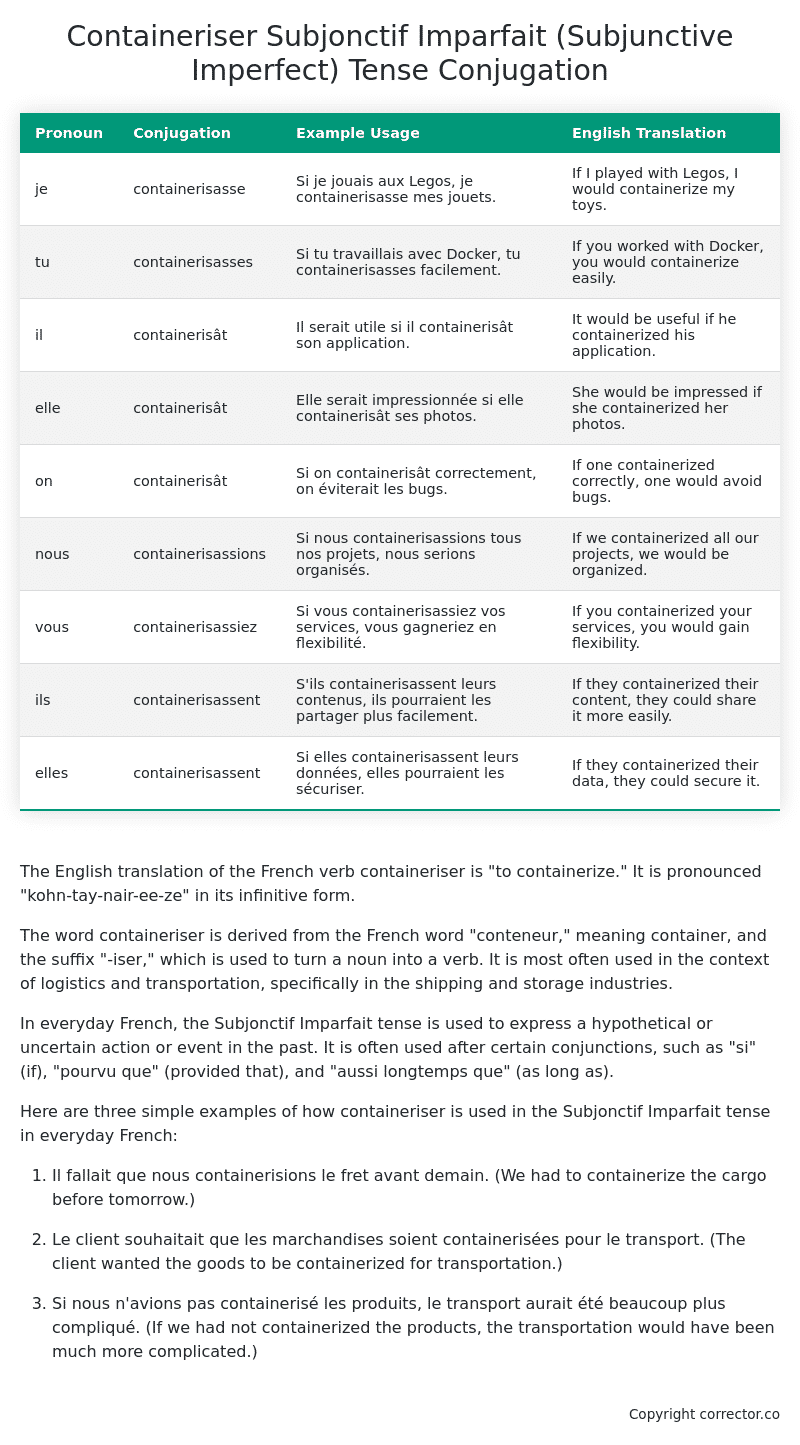Subjonctif Imparfait (Subjunctive Imperfect) Tense Conjugation of the French Verb containeriser
Introduction to the verb containeriser
The English translation of the French verb containeriser is “to containerize.” It is pronounced “kohn-tay-nair-ee-ze” in its infinitive form.
The word containeriser is derived from the French word “conteneur,” meaning container, and the suffix “-iser,” which is used to turn a noun into a verb. It is most often used in the context of logistics and transportation, specifically in the shipping and storage industries.
In everyday French, the Subjonctif Imparfait tense is used to express a hypothetical or uncertain action or event in the past. It is often used after certain conjunctions, such as “si” (if), “pourvu que” (provided that), and “aussi longtemps que” (as long as).
Here are three simple examples of how containeriser is used in the Subjonctif Imparfait tense in everyday French:
-
Il fallait que nous containerisions le fret avant demain. (We had to containerize the cargo before tomorrow.)
-
Le client souhaitait que les marchandises soient containerisées pour le transport. (The client wanted the goods to be containerized for transportation.)
-
Si nous n’avions pas containerisé les produits, le transport aurait été beaucoup plus compliqué. (If we had not containerized the products, the transportation would have been much more complicated.)
Table of the Subjonctif Imparfait (Subjunctive Imperfect) Tense Conjugation of containeriser
| Pronoun | Conjugation | Example Usage | English Translation |
|---|---|---|---|
| je | containerisasse | Si je jouais aux Legos, je containerisasse mes jouets. | If I played with Legos, I would containerize my toys. |
| tu | containerisasses | Si tu travaillais avec Docker, tu containerisasses facilement. | If you worked with Docker, you would containerize easily. |
| il | containerisât | Il serait utile si il containerisât son application. | It would be useful if he containerized his application. |
| elle | containerisât | Elle serait impressionnée si elle containerisât ses photos. | She would be impressed if she containerized her photos. |
| on | containerisât | Si on containerisât correctement, on éviterait les bugs. | If one containerized correctly, one would avoid bugs. |
| nous | containerisassions | Si nous containerisassions tous nos projets, nous serions organisés. | If we containerized all our projects, we would be organized. |
| vous | containerisassiez | Si vous containerisassiez vos services, vous gagneriez en flexibilité. | If you containerized your services, you would gain flexibility. |
| ils | containerisassent | S’ils containerisassent leurs contenus, ils pourraient les partager plus facilement. | If they containerized their content, they could share it more easily. |
| elles | containerisassent | Si elles containerisassent leurs données, elles pourraient les sécuriser. | If they containerized their data, they could secure it. |
Other Conjugations for Containeriser.
Le Present (Present Tense) Conjugation of the French Verb containeriser
Imparfait (Imperfect) Tense Conjugation of the French Verb containeriser
Passé Simple (Simple Past) Tense Conjugation of the French Verb containeriser
Passé Composé (Present Perfect) Tense Conjugation of the French Verb containeriser
Futur Simple (Simple Future) Tense Conjugation of the French Verb containeriser
Futur Proche (Near Future) Tense Conjugation of the French Verb containeriser
Plus-que-parfait (Pluperfect) Tense Conjugation of the French Verb containeriser
Passé Antérieur (Past Anterior) Tense Conjugation of the French Verb containeriser
Futur Antérieur (Future Anterior) Tense Conjugation of the French Verb containeriser
Subjonctif Présent (Subjunctive Present) Tense Conjugation of the French Verb containeriser
Subjonctif Passé (Subjunctive Past) Tense Conjugation of the French Verb containeriser
Subjonctif Imparfait (Subjunctive Imperfect) Tense Conjugation of the French Verb containeriser (this article)
Conditionnel Présent (Conditional Present) Tense Conjugation of the French Verb containeriser
Conditionnel Passé (Conditional Past) Tense Conjugation of the French Verb containeriser
L’impératif Présent (Imperative Present) Tense Conjugation of the French Verb containeriser
L’infinitif Présent (Infinitive Present) Tense Conjugation of the French Verb containeriser
Struggling with French verbs or the language in general? Why not use our free French Grammar Checker – no registration required!
Get a FREE Download Study Sheet of this Conjugation 🔥
Simply right click the image below, click “save image” and get your free reference for the containeriser Subjonctif Imparfait tense conjugation!

Containeriser – About the French Subjonctif Imparfait (Subjunctive Imperfect) Tense
Formation
Common Everyday Usage Patterns
Interactions with Other Tenses
Subjonctif Présent
Indicatif Passé Composé
Conditional
Conditional Perfect
Summary
I hope you enjoyed this article on the verb containeriser. Still in a learning mood? Check out another TOTALLY random French verb conjugation!


